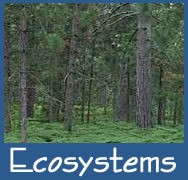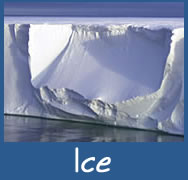- HOME |
- PEOPLE |
- RESEARCH |
- PUBLICATIONS|
- NEWS AND EVENTS |
- SEMINARS
Welcome to the ESSC Web page...
Founded within the College of Earth and Mineral Sciences in 1986, the Earth System Science Center (ESSC) maintains a mission to describe, model, and understand the Earth's climate system. ESSC is one of seven centers supported by the Earth & Environmental Systems Institute.
The climate can be viewed as a complex interacting set of components including the oceans, atmosphere, cryosphere, and biosphere. Within the ESSC, we are engaged in studies that aim to understand both these individual components, and the interactions between them.
Our approach involves:
- Employing a hierarchy of theoretical climate system models to perform long-term, high resolution climate model integration experiments aimed at understanding internal and forced changes in the climate system, including modern human or "anthropogenic" impacts on climate
- Emphasis on "process" to bridge problems on multiple timescales: Examining the interactions in the North Atlantic coupled ocean-atmosphere-cryosphere system, the dynamics of the tropical Pacific coupled system, the role of the hydrologic cycle and freshwater in climate change, the relationship between climate variability and synoptic-scale dynamics, and the relationship between ocean biogeochemistry and climate change
- A combination of modeling, empirical analysis, and exploration of fundamental processes to investigate the behavior of the climate system. This includes coupled ocean-atmosphere climate modeling, reconstruction of past climate using paleoclimate data, the comparison of models and observations, and the study of fundamental processes in the earth system
- Development of new educational tools including interactive climate modeling tools tools to service both Penn State and the broader community
Highlights...
| The 2022 Penn State ESSC Atlantic Hurricane Season Forecast ESSC scientists Dr. Michael E. Mann and Daniel J. Brouillette and alumnus Dr. Michael Kozar have released their 2022 Atlantic Hurricane Season Forecast. The forecast calls for between 11 and 19 named storms, with a best estimate of 19 named storms, which would represent another above-normal season in the basin. Read More >> |
|
Another record: Ocean warming continues through 2021 despite La Nina conditions |
|
| The 2021 Penn State ESSC Atlantic Hurricane Season Forecast ESSC scientists Dr. Michael E. Mann and Daniel J. Brouillette and alumnus Dr. Michael Kozar have released their 2021 Atlantic Hurricane Season Forecast. The forecast calls for between 9 and 15 named storms, with a best estimate of 12 named storms. Read More >> |
|
| Apparent Atlantic warming cycle likely an artifact of climate forcing ESSC scientists Dr. Michael E. Mann and Daniel J. Brouillette and alumni scientists Dr. Byron Steinman and Sonya Miller are co-authors of a study that shows that the Atlantic Multidecadal Oscillation is not due to natural factors but, rather, due to the climate forcings of human influence and volcanic eruptions. Read more>> Read the paper>> |
|
| Increasing ocean stability decreases productivity and reduces carbon burial ESSC director Dr. Michael E. Mann is a co-author on a study that shows that ocean stratification is greater than previously thought, which has a range of implications, including a positive feedback of increasingly warm near-surface waters, decreasing ocean productivity due to reduced oxygen uptake, reduced carbon burial, and potentially stronger tropical cyclones. Read more>> Read the paper>> |
|
| The 2020 Penn State ESSC Atlantic Hurricane Season Forecast ESSC scientists Dr. Michael E. Mann and Daniel J. Brouillette and alumnus Dr. Michael Kozar have released their 2020 Atlantic Hurricane Season Forecast. The forecast calls for between 15 and 24 named storms, with a best estimate of 20 named storms. Read more >> |
|
| Atlantic and Pacific oscillations lost in the noise ESSC director Dr. Michael E. Mann and ESSC alumni scientists Dr. Byron Steinman and Sonya Miller have found that the so-called Atlantic Multi-Decadal Oscillation and Pacific Decadal Oscillation are indistinguishable from the background noise of internal climate variability. Read more >> Read the paper >> | |
| The 2019 Penn State ESSC Atlantic Hurricane Season Forecast Dr. Michael Mann, alumnus Dr. Michael Kozar, and researcher Sonya Miller have released their 2019 Atlantic Hurricane Season Forecast. The forecast calls for between 7 and 13 named storms with a best estimate of 10 named storms. Read more >> |
|
| Controlling future summer weather extremes still within our grasp ESSC Director Dr. Michael Mann and others have published a paper looking at summertime extreme weather patterns in future scenarios of global warming. While climate change will initially exacerbate extreme weather, it is possible that reduction of aerosols from atmospheric pollution could counteract this effect. Read more >> Read the paper >> |
|
| Sea-level rise, not stronger storm surge, will cause future NYC flooding Dr. Andra J. Reed has published a paper with Dr. Michael Mann, Dr. Richard Alley, Dr. David Pollard, and others about the likelihood of more frequent flooding in the New York City region due to climate change and storm surge from tropical systems. Read more >> Read the paper >> |
|
|
Human-caused warming likely led to recent streak of record-breaking temperatures ESSC Director Dr. Michael Mann and others have published a paper in Geophysical Research Letters stating that it is "extremely unlikely" that 2014, 2015, and 2016 would not have been the warmest consecutive years on record without anthropogenic climate change. Read more >> Read the paper >> |





